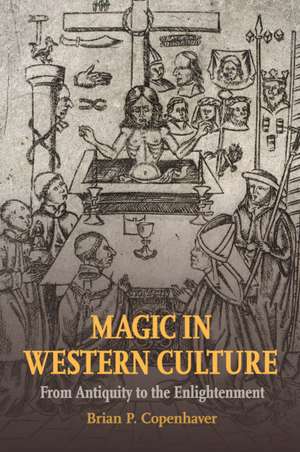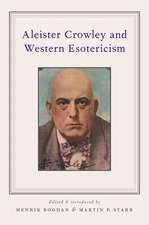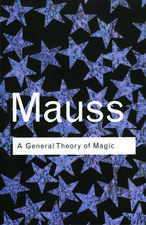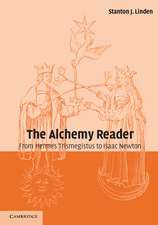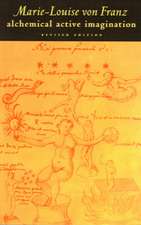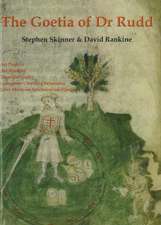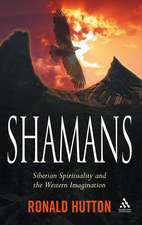Magic in Western Culture: From Antiquity to the Enlightenment
Autor Brian P. Copenhaveren Limba Engleză Paperback – 3 oct 2018
| Toate formatele și edițiile | Preț | Express |
|---|---|---|
| Paperback (1) | 272.27 lei 3-5 săpt. | |
| Cambridge University Press – 3 oct 2018 | 272.27 lei 3-5 săpt. | |
| Hardback (1) | 902.79 lei 6-8 săpt. | |
| Cambridge University Press – 8 sep 2015 | 902.79 lei 6-8 săpt. |
Preț: 272.27 lei
Nou
Puncte Express: 408
Preț estimativ în valută:
52.10€ • 55.71$ • 43.44£
52.10€ • 55.71$ • 43.44£
Carte disponibilă
Livrare economică 27 martie-10 aprilie
Preluare comenzi: 021 569.72.76
Specificații
ISBN-13: 9781107692176
ISBN-10: 1107692172
Pagini: 614
Ilustrații: 108 b/w illus.
Dimensiuni: 152 x 228 x 30 mm
Greutate: 0.81 kg
Editura: Cambridge University Press
Colecția Cambridge University Press
Locul publicării:New York, United States
ISBN-10: 1107692172
Pagini: 614
Ilustrații: 108 b/w illus.
Dimensiuni: 152 x 228 x 30 mm
Greutate: 0.81 kg
Editura: Cambridge University Press
Colecția Cambridge University Press
Locul publicării:New York, United States
Cuprins
Part I. Introduction: 1. The scruples of J. G. Frazer; 2. Magic as a classical tradition and its philosophical foundations; Part II. Mageia: 3. Ancient philosophy in Ficino's magic I: Plotinus; 4. Ancient philosophy in Ficinio's magic II: Neoplatonism and the Chaldaean Oracles; 5. Ancient philosophy in Ficino's magic III: Hermes and Proclus; 6. Scholastic philosophy in Ficino's magic; 7. Data: a tale of two fish; Part III. Hermetica: 8. Hermes the theologian; 9. Hermes domesticated; 10. Hermes on parade; Part IV. Magic Revived and Rejected: 11. How to do magic, and why; 12. Nature, magic, and the art of picturing; 13. The power of magic and the poverty of erudition; 14. Disenchantment; Part V. Conclusion: 15. Who killed Dabholkar?
Recenzii
'Brian P. Copenhaver's Magic in Western Culture is a towering achievement in the field of intellectual history that is evidently the product of years - or decades, one suspects - of its author's immersion in the primary sources. In spite of its focus on the history of magic, this book is in fact essential reading for students of the history of ideas, the history of philosophy, the history of medicine, the history of science and even students of art history, since Copenhaver places great stress on the significance of images in both the development and the dismemberment of the western magical tradition. It would be a shame if the book's readership were confined to historians of magic, since its significance is so much more far-reaching.' Francis Young, Reviews in History
'This is a significant work that brings together decades of thinking about an important subject for the history of science and helps to cast it in a new light. It is grand in scope and ambition, seeking a big picture that provides a convincing account and critique of writings about magic over a long period.' Richard Dunn, British Journal for the History of Science
'Magic in Western Culture is the culmination of nearly half a century of research on the magical and occult tradition in Europe. … This is a very rich book …' Rienk Vermij, Isis
'Brian P. Copenhaver is an eminence grise in the history of magic especially as it relates to the history and philosophy of science in the Renaissance; he has been grounding, clarifying, and revising the scholarly understanding of early modern magic and its philosophical-cosmological underpinnings for some four decades now … Magic in Western Culture remains a book filled with intellectual treasures; it is also a handy updated collection of some of Copenhaver's best work on the history of magic in a package that both scholars and students will take pleasure in reading.' Claire Fanger, Metascience
'This is a significant work that brings together decades of thinking about an important subject for the history of science and helps to cast it in a new light. It is grand in scope and ambition, seeking a big picture that provides a convincing account and critique of writings about magic over a long period.' Richard Dunn, British Journal for the History of Science
'Magic in Western Culture is the culmination of nearly half a century of research on the magical and occult tradition in Europe. … This is a very rich book …' Rienk Vermij, Isis
'Brian P. Copenhaver is an eminence grise in the history of magic especially as it relates to the history and philosophy of science in the Renaissance; he has been grounding, clarifying, and revising the scholarly understanding of early modern magic and its philosophical-cosmological underpinnings for some four decades now … Magic in Western Culture remains a book filled with intellectual treasures; it is also a handy updated collection of some of Copenhaver's best work on the history of magic in a package that both scholars and students will take pleasure in reading.' Claire Fanger, Metascience
Notă biografică
Descriere
This richly illustrated and groundbreaking book treats magic as a classical tradition with foundations that were distinctly philosophical.
